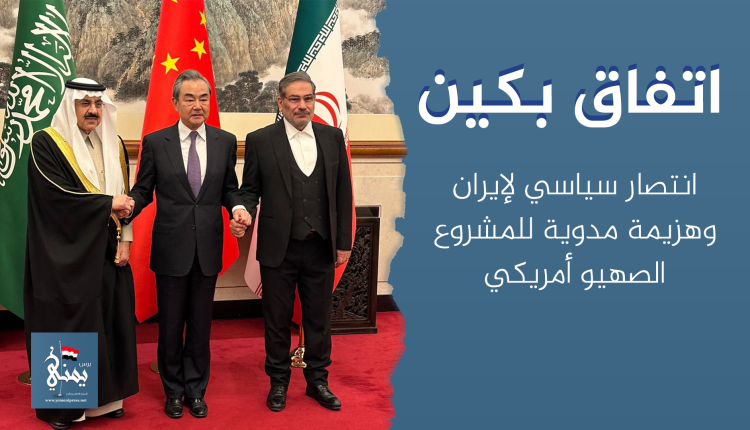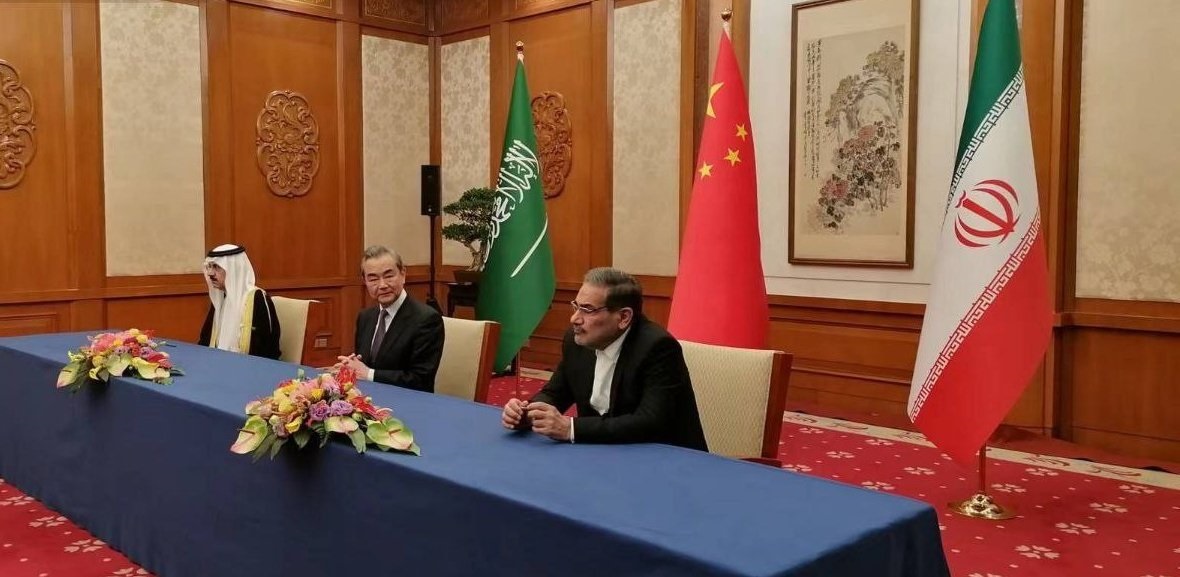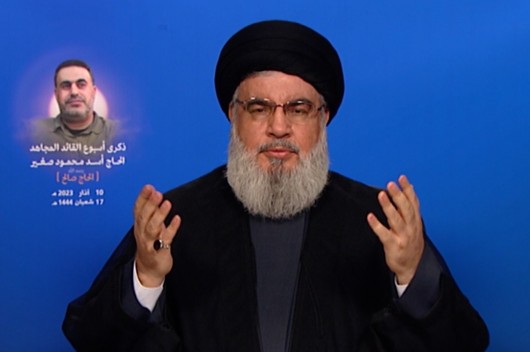After nearly seven years of stalemate, and after five previous rounds of negotiations in Muscat and Baghdad, Iran and Saudi Arabia announced yesterday, Friday, in a joint statement, the agreement to resume negotiations and diplomatic relations, and to reopen the embassies in the two countries within two months.
After several days of intense negotiations between the Secretary of the Iranian Supreme National Security Council and his Saudi counterpart in Beijing, an agreement was reached on Friday to resume relations between the two countries, during a ceremony of officially signing a joint statement between Iran, Saudi Arabia and China. According to the statement, Tehran and Riyadh confirmed the principle of Respect for sovereignty and non-interference in the internal affairs of the two countries, and implementation of the security cooperation agreement signed in 2001.
Victory for peace
The agreement to resume Saudi-Iranian diplomatic relations received wide Arab and regional responses, as Chinese Foreign Minister Chen Wang Yi, the chief Chinese diplomat, indicated, on Friday, that “the resumption of diplomatic relations between Saudi Arabia and Iran is a “victory” for dialogue and peace.
The Chinese Foreign Ministry quoted Wang as saying at the conclusion of the talks between Saudi Arabia and Iran that the resumption of relations is "great news" in the current turbulent situation worldwide, adding that China will continue to play a constructive role in dealing with issues in the world today and will show its "responsibility" as a major country.
Returning relationships promote stability
Iranian Foreign Minister Hossein Amir Abdollahian indicated that “the return of normal relations between Iran and Saudi Arabia provides great capabilities for the two countries, the region and the Islamic world,” noting that “neighborhood policy, as the main focus of the foreign policy of the thirteenth government, is moving strongly in the healthy direction, and the diplomat system is actively behind preparing more regional steps.”
While the Secretary-General of the Iranian Supreme National Security Council, Ali Shamkhani, affirmed that “the return of diplomatic relations with Saudi Arabia enhances regional stability and security,” pointing out that “according to the agreement, ambassadors will be exchanged between Tehran and Riyadh within two months,” praising China for its role in restoring relations between Tehran and Riyadh.

One destiny, common denominators
For his part, Saudi Foreign Minister Faisal bin Farhan said, “The resumption of relations between Riyadh and Tehran stems from our vision based on the preference for political solutions.” He added that the countries of the region share “one destiny and common denominators that make it necessary for us to support each other to build a model of prosperity and stability.”
Saudi National Security Adviser Musaed Al-Aiban said that Saudi Arabia welcomes the initiative of the Chinese president to develop relations between the Kingdom and Iran, noting that “the Saudi-Iranian agreement is the culmination of the discussions that took place during the current week,” stressing that Riyadh was keen to make the agreement with Iran within the framework of brotherly ties. It was also keen to open a new page and adhere to international conventions.
A victory for Iran and a resounding defeat for the Zionists
While the former Prime Minister of the Zionist entity, Naftali Bennett, considered the agreement to restore relations between Iran and Saudi Arabia a “political victory for Iran,” a resounding defeat and a complete failure for the government of the usurper entity.
According to the media of the Zionist enemy, Bennett said, yesterday, Friday: “The renewal of relations between Saudi Arabia and Iran is a dangerous development for” Israel “and a political victory for Iran, and this is a fatal blow to efforts to build a regional alliance against Iran.” He also considered the news a major setback for the current prime minister and his government.

Not on Yemen's expense
The Secretary-General of Hezbollah, Sayyid Hassan Nasrallah, affirmed that the Iranian-Saudi rapprochement will not be at the expense of the Yemeni people, nor at the expense of Syria or the resistance, calling on the Arabs to re-normalize their relations with Syria.
Sayyid Nasrallah indicated, during his speech at Leader Asad Sagheer Week, that the signing of the agreement to resume diplomatic relations between Riyadh and Tehran is a good transformation, expressing his happiness. He pointed out that this will be in the interest of the peoples of the region, pointing out that the Saudi-Iranian agreement, if it proceeds in the normal course, will open horizons throughout the region, including Lebanon.
The region needs a return to normal relations
While the head of the national negotiating delegation, Mohammed Abdul-Salam confirmed, on Friday, that the region needs the return of normal relations between its countries, indicating in a tweet that the return of relations between the countries of the region will restore the Islamic nation’s lost security as a result of foreign interventions, led by the Zionist-Americans that worked hard on regional disputes, and used the Iran was taken to stir up conflicts and aggression against Yemen.
Our battle with the countries of aggression is independent
The member of the Political Bureau of Ansar Allah, Mohammed al-Bukhaiti, considered that the agreement between Saudi Arabia and Iran to restore relations between them is a courageous decision for both countries.
Moreover, he stressed that the return of the relationship between Riyadh and Tehran before its return between Sanaa and Riyadh confirms that the battle with the countries of aggression is an independent battle, and will not end until Yemen restores its sovereignty and independence. However, he said, it is expected that this development will reflect positively not only on the Yemeni-Saudi relations, but also on the overall relations of the Arab and Islamic countries with each other, given the weight that Saudi Arabia and Iran represent. Al-Bukhaiti noted that any rapprochement between the Islamic countries is welcome because this is in their interest and disturbs America and Israel.
The agreement will change the future of the region
Analysts pointed out that the Saudi-Iranian agreement will change the future of the region and will lead to resolving most of its crises in Yemen, Syria, and Iraq.
Analysts believe that China is well aware that it is not possible to build a solid economic partnership with Saudi Arabia without a clear Iranian cover. Over the past months, it has sought rapprochement between Iran and Saudi Arabia in service of its great economic project, in which the Persian Gulf region is the central focal point, pointing out that the most important thing for China is to ensure security of sea lanes, and Iran is the basis of the matter.
A major hit against the Zionist American project
Analysts stressed that the biggest loser from the return of diplomatic relations between Tehran and Riyadh is the Zionist entity, which was aiming to mobilize the countries of the region towards hostility with Iran, noting that the Iranian-Saudi rapprochement will smash the American-Zionist project, which aims to prevent building constructive relations between two regional powers politically, economically and militarily. This relationship hinders the Zionist entity from achieving domination in the region, and this usurper entity is an integral part of American national security.









